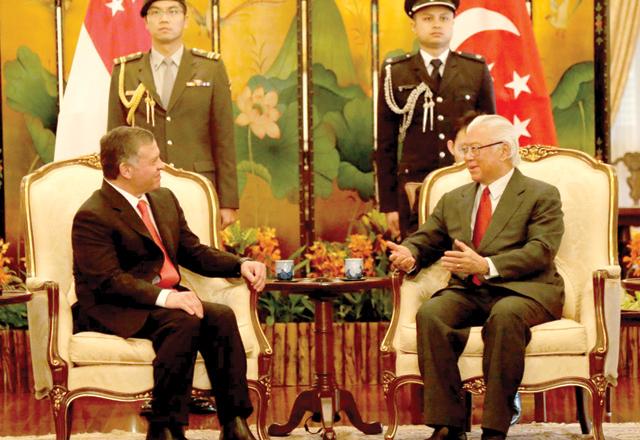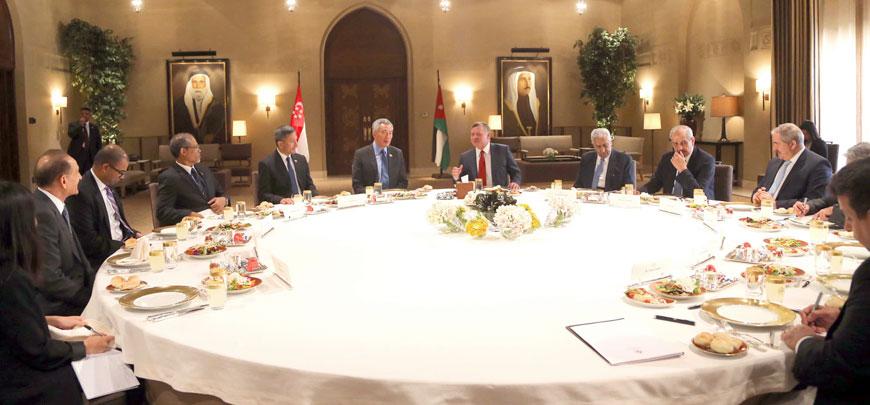You are here
Jordan, Singapore set to increase economic cooperation
Feb 25,2014 - Last updated at Feb 25,2014

AMMAN — His Majesty King Abdullah on Monday held talks with Singapore President Tony Tan that focused on bilateral ties and means to develop cooperation at all levels, especially in the economic domain.
Discussions, which were held in Singapore, covered the latest developments in the Middle East, particularly those related to efforts exerted to bring about peace between the Palestinians and the Israelis and the situation in Syria.
The two leaders underlined their commitment to further enhancing bilateral cooperation in all areas to best serve the interests of both countries during a dinner banquet held in honour of the King and the accompanying delegation, according to a Royal Court statement.
The Monarch highlighted Jordan’s interest in expanding cooperation with Singapore in the fields of investment, trade and economy, especially as Amman and Singapore are signatories to a free trade agreement since 2004.
He cited the Kingdom’s strategic location as a gateway to the Middle East and a crossroad between three continents, coupled with the stability, security and qualified manpower that the Kingdom boasts, in addition to its free trade agreements with several regional and international partners.
King Abdullah underlined the importance of taking advantage of incentives provided by the Jordanian economy and facilities provided to investors to strengthen cooperation between Jordan and Singapore and open wider horizons for the public and private sectors in the two countries.
Singapore is considered a leading model for small countries with scarce resources that has managed to rank first in providing an investment environment according to the 2011 Economic Freedom Index.
During discussions, the King said Jordan deems Singapore a model, not only at the regional, but also at the international level due to its huge achievements, voicing the Kingdom’s keenness to benefit from the Asian country’s experience, especially in the area of building and developing human resources.
He noted that there are many similarities between the two countries in their quest to enter the global market and improve their growth rates, adding that the two countries contribute to building bridges of friendships and cooperation between Asia and the Middle East through Jordan.
King Abdullah indicated that the Kingdom, which assumes a UN Security Council seat representing Arab Asia and the Far East, aims at coordinating with Asian and the Organisation of Islamic Cooperation states to build a mutual stance vis-à-vis regional and international issues.
For his part, the Singaporean president expressed his hope that the visit would be an opportunity to develop ties with Jordan at all levels and cooperate more with the Kingdom, which plays a “unique” role in maintaining peace, security and stability in the world.
Tan praised His Majesty’s “wise policy”, which made Jordan a model of interfaith tolerance, citing the Amman Message and the King’s role as an Arab Muslim leader in entrenching the concepts of tolerance and justice in the Middle East and the world.
He said that Jordan plays a significant role as a non-permanent UN Security Council member.
Politically, the two leaders called for supporting efforts brokered by the US to bring about just and comprehensive peace in the region and in a way that ensures the rights of all stakeholders and guarantees the security and stability of the region’s peoples.
King Abdullah reiterated Jordan’s stance backing the ongoing negotiations between the Palestinians and Israelis based on the two-state solution, the relevant international resolutions and particularly the 2002 Arab Peace Initiative. Such a solution, he re-asserted, should lead to the establishment of a viable and independent state on the 1967 borders with East Jerusalem as its capital.
Regarding the situation in Syria, the Monarch and Tan called for finding a political solution for the crisis that will end the suffering of the Syrian people.
The King highlighted the burdens Jordan is enduring due to hosting a large number of refugees.
Jordan and Singapore are signatories to several economic and investment agreements, in addition to cooperation protocols in the areas of ICT, transport, tourism and culture, according to the Royal Court.
In a statement to the Jordan News Agency, Petra, Foreign Minister Nasser Judeh said the King’s visit to Singapore was “significant” as the Monarch appreciates the Singaporean model, as the Asian country is similar to Jordan in terms of the shortage in resources and its thrive to invest in the human capital.
Meanwhile, King Abdullah met with leaders of the Singapore Business Federation and a number of elite economic figures, businesspeople and investors, according to the Royal Court.
He highlighted steps realised by Jordan to improve its economic performance through adopting pieces of legislation to enhance its economic activities and investment environment.
The Monarch said that the Kingdom managed to maintain its stability and security despite the situation in the region and the ramifications of the global economic crisis, which led to becoming an attractive investment destination backed with massive development plans, qualified human capital and proper infrastructure.
He stressed that Jordan’s vision entails turning challenges into opportunities and building on them through a secure investment atmosphere, urging the Singaporean private sector and businesspeople to take advantage of benefits provided by the Jordanian economy and establish partnerships with their Jordanian counterparts that can increase trade volume.
In light of the various bilateral and international agreements signed by the Kingdom, the Jordanian market represents a gateway for more than one billion consumers, His Majesty said, pointing out that this is in the best interest of investors and businessmen seeking to benefit from these advantages.
Jordan is interested in attracting investments in the mining, tourism, transport, IT, energy and water sectors, the King said, adding that Jordan facilitates investments in various economic and commercial fields.
The King voiced hope the meeting would maximise the partnership with Singapore, noting that ICT sector constitutes 13 per cent of the GDP, ranking 10th among the best places to establish ICT start-ups and number one in terms of the number of funded projects.
A number of Singaporean businesspeople voiced their willingness to cooperate with Jordanian economic institutions and the private sector to explore investment opportunities.
Established in 2002, the Singaporean Business Federation was founded to play the role of the commerce chamber in defending the rights of the business community in Singapore, representing more than 20,000 local and foreign companies.
Singapore is considered one of the fast-growing economies in the world according to the World Bank, placing 11th globally in terms of the GDP per capita, the statement read.
Minister of Industry, Trade and Supply Hatem Halawani added that the Singaporean businessmen expressed interest in building partnerships with Jordan after being briefed on the opportunities it offers, including its security, stability and advantageous location.
On the sidelines of the Royal visit, King Abdullah met with the administration of the Institute of Technical Education (ITE).
His Majesty also toured the ITE’s facilities and departments and was briefed on its curricula and the technology it implements.
Hundreds of students graduate from the institute every year.
The King expressed Jordan’s wish to benefit from the ITE’s experience to build youth capacities and enhance the work of technical education institutes to enable them to keep up with the demands of the job market.
He urged the ITE to expand its exchange and training programmes in cooperation with the concerned institutions in Jordan and Singapore, utilising Jordan’s advantageous location to build the capacities of students in the region to provide the Middle East labour market with qualified human resources.
King Abdullah highlighted the role of vocational training institutes in supporting economic development, adding that the Kingdom has established 44 vocational training centres since 1979.
In an interview with Petra, ITE Director and Chief Executive Bruce Poh said the King’s visit will push the institute towards increasing cooperation with other entities in the field of technical education, noting that the educational facility, which was founded in 1992, will hold several meetings with potential Jordanian partners to coordinate this cooperation.
Vocational education represents an important factor in Singapore’s economy, he said, adding that the institute offers training programmes based on the labour market’s needs.
ITE is ready to share its expertise with the Kingdom, Poh added. The regional training centre founded by the institute in Amman will offer opportunities for cooperation in various fields of training, he said.
HRH Prince Ghazi, the King’s chief adviser for religious and cultural affairs and personal envoy, and other members of the Jordanian delegation accompanied the King on his visit to the ITE.
Vocational Training Corporation Director General Majed Habashneh said Jordan seeks to benefit from Singapore’s expertise in vocational training.
During the King’s visit, Jordan and Singapore signed two memoranda of understanding in the fields of human resource development and investment.
The first memo, signed by Judeh and his counterpart Grace Fu, entails expanding the umbrella of the regional refrigeration and air conditioning training centre established by Singapore in Amman in 2007.
Judeh said the memo will help enhance vocational training capacities in water resource management and economic development, stressing that it will usher in further cooperation with Singapore.
For her part, Fu said her country is ready to provide Jordan with qualified trainers to build the capacity of the training centre’s human resources.
Singapore is keen on increasing cooperation between Asia and Middle East countries through expertise exchange, she noted.
The second memo was signed between Jordan Industrial Estates Corporation (JIEC) and Ramatex group to establish a $35 million investment in Al Hussein Bin Abdullah II Industrial City in Karak.
The investment will be implemented over two phases and will entail the establishment of textile factories at the city over 122 dunums to offer around 9,000 job opportunities on the long term.
Halawani said work on the project will start by the end of this year, noting that the first phase will cover 65 dunums, to conclude by mid-2015 and offer between 2,000 and 3,000 jobs.
JIEC Chief Executive Loai Sehwail said the project will be among the major investments in the Kingdom in the textile industry.
Related Articles
AMMAN — His Majesty King Abdullah on Sunday said Jordan is looking forward to enhancing and expanding relations with Singapore, mainly in ec
AMMAN — Singapore’s President Halimah Yacob on Thursday received Minister of Foreign Affairs and Expatriates Ayman Safadi, a Foreign Ministr
His Majesty King Abdullah will start an official visit to Singapore and Indonesia Sunday, during which he will hold talks with senior officials from both countries that focus on economic ties and regional developments.

















